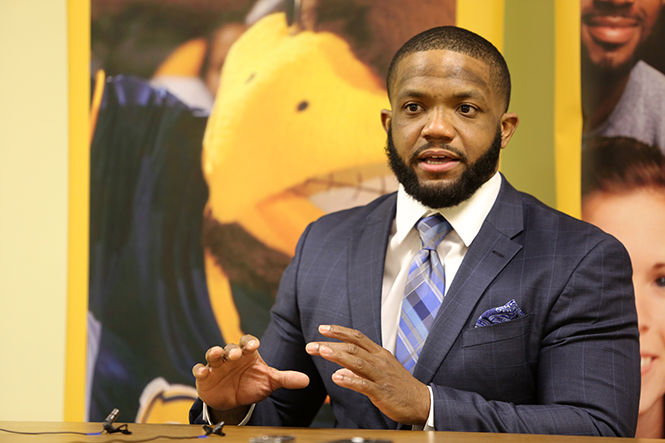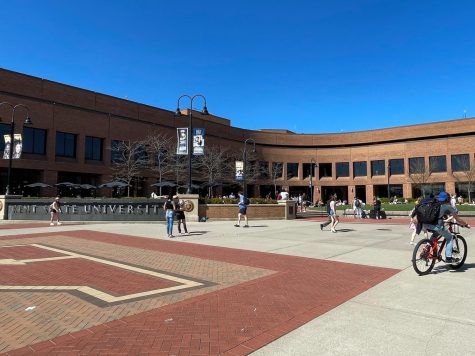Youngstown Boy’s second chances ‘build better student athletes’
Maurice Clarett holds a press conference prior to his speech in the Kent State Ballroom on Tuesday, Feb. 24, 2015. The former Ohio State football player spoke about his troubled past, run-in with the law, and how students should avoid making his mistakes.
February 25, 2015
Former Ohio State football standout Maurice Clarett visits Kent State to share his story and steer students down the right path.
You see it in the news all the time.
Incredibly talented college football player squanders his potential and throws away his opportunity – words like these make headlines much too often.
Time and time again these gifted athletes let their ego get the best of them and allow their off-the-field issues adversely affect themselves and the team around them.
One such tragic case all-too-familiar to Ohioans is that Maurice Clarett, a household name that still resonates with residents from Youngstown all the way to Columbus.
In just his freshman year at Ohio State back in 2001, Clarett had it all – athletic ability, campus renown, women – everything.
As Big Ten Freshman of the Year in 2002, Clarett rushed for 1,237 yards and scored 18 touchdowns, which helped the Buckeyes to a perfect 14-0 record and led them to a seventh National Championship against Miami.
Clarett racked up an impressive list career highlights during his freshman season, but trouble would follow Clarett the rest of his short-lived football career. He became more well-known for his actions off the field, which included suspension dismissal from Ohio State, several arrests and even three and a half years of imprisonment. Most recently his troubled tale has been well-documented by ESPN 30 for 30 film Youngstown Boys and his own book, My Life. My Story. My Redemption.
“The fact that football was taken away from me…I didn’t know what to do,” Clarett said.
Although the Youngstown native led a mostly troubled life, he said he feels grateful for the chance to turn his life around and make a difference. Clarett, now 31, straightened out his life upon exiting prison and decided to use his new lease on life as an opportunity to educate and encourage youths by travelling around the country and sharing his story.
He spent less than an hour Tuesday night speedily narrating his story to a crowd of students in the Kent State Student Center Ballroom, with coach Paul Haynes and numerous members of the football team present.
When members of the media asked Clarett to describe himself as a 20-year-old college student like the many in attendance, the best phrase he could use was “just living for the moment.”
He chronicled his detailed story an aimless young man who couldn’t see past tomorrow.
“Just waking up and whatever came up is what I did,” Clarett said. “If I wanted to party, I partied. If I wanted to hang out with women, I hung out with women.”
Life didn’t give Clarett the wakeup call he needed until he was incarcerated in 2006. Believe it or not, prison proved to be the turning point.
He found the start of his redemption in on of the most unlikely places at the time: books.
“I enjoy reading and get my guidance from books I read,” Clarett said.
Clarett said reading books gave him direction at a time in his life when he was lost and searching for answers. The idea of self-education intrigued him and gave him something productive to do.
Clarett, who took a lot of “fluff” classes in college like officiating golf, officiating softball and women’s studies, said he felt cheated out of a quality education and decided to take it upon himself to become a more educated, well-rounded individual. Clarett said student-athletes are placed on campus where they take fluff classes, something Clarett said did nothing for him in the long run when he attended Ohio State.
Most of the time Clarett found solace in the books he read, which inspired a pent-up, untapped creative side of his mind and motivated him to launch a blog.
“I took that creative energy and just wrote, and I think it’s the purest form of expression. You can take what’s in your head and put it on a piece of paper and really help another person understand where it is your coming from.”
If Clarett could go back and give himself advice for the future, he said he would’ve have taken his college education as seriously as he did in prison.
“I should have made it into the NFL…I should have made a lot of money, but for most cases, a lot of guys who come up in my situation put a heavy emphasis on going into the NFL or the NBA, and they never really get the student-athlete experience on campus, embrace and explore what it really means to be a skilled professional,” he said.
Clarett addressed student-athletes in the audience, specifically members of the football team, urging them to value their education and take advantage of college resources.
“That’s one thing I didn’t take seriously, and when you rewind the tape, and football’s taken away from me…I just didn’t have any direction,” he said. “(Football’s) the only thing I invested myself into. That’s the only thing I put all my energy into.”
As a result, Clarett had nowhere to turn when faced with NCAA violations and trouble with the law that doomed his Buckeyes career. When a promising NFL career never panned out, drugs, sex and partying became his only outlet – his only means of escape from a life stripped of football.
“If you don’t have any direction, you’re going to fall flat on your face,” Clarett said. “When football was removed from my life, I literally had nothing to fall back upon,” Clarett said. “If we understand that only 1 percent of these guys go (into the NFL) and out of those guys on average stay for four years, how are we servicing these guys when they’re on campus?”
In his speaking tours, Clarett advocates for change in colleges across the country, imploring them to improve their approach to education and place a greater emphasis on their in-class, off-the-field activities.
“What happens when your coursework doesn’t mimic what it that you really want to do with the rest of your life,” he said. “Maybe I went through these experiences to speak for guys who aren’t aware of what situation that they’re in. You realize you were able to endure some of these experiences, then you were able to speak for people who can’t speak for themselves.”
Clarett didn’t place all the blame on a possibly broken NCAA system, but rather encouraged student-athletes to take charge of their education using the tools college provides them.
“I personally believe if you develop a better man, you develop a better athlete. We need to quit hanging on the dangling carrot of the only way that you can be successful is to play football or to run your head into a wall.”
Clarett said his message extends much further than his visits “making people feel good for a moment.” His mission is dedicated to the bigger picture, the underlying issue with the infrastructure of Division I football schools.
“Let’s educate them better, let’s just build better individuals and understand where these guys are coming from, and that’s more or less what I’m pushing – to really get the most out of their education,” he said.
Clarett’s speaking at events like this has had a direct influence on students’ lives. One speech he gave at Bethune-Cookman University in Daytona Beach, Fla., might have helped save someone’s life.
Afterward a long day of speeches, a student approached him asking for guidance, so Clarett gave him his contact information and suggested he call him if he needed help.
When Clarett was walking outside Drug Mart in Columbus, the young man called and said he had gotten mixed up the wrong crowd. He told Clarett he owed a drug dealer money and faced death threats. Clarett directed the student to university staff to ensure that he was in good hands.
“He’s OK (now),” Clarett said. “It’s not to say that was the cure-all to everything, but I’m happy at that moment I was able to chat with him.”
But what does Clarett get out of all this?
To Clarett, his tours have given him a chance to build better individuals, something that eluded him in his own life ever since he garnered national attention at Warren G. Harding High School in Warren.
But more than anything, it’s a second chance. Now life finally makes sense to Clarett.
He said he plans to re-enroll at Ohio State this summer and pursue a major in sports management. He’s currently in the process of obtaining freshman forgiveness for the D’s, F’s and incompletes he collected during the spring semester of his sophomore year, which will raise his GPA enough to begin scheduling for classes.
Clarett is also raising his family, as he, his fiancé, Ashley Evans, and 8-year-old daughter reside in Columbus. He told students he’s involved in a packaging business and considers himself a businessman now.
“I mentor a lot of guys, but I’m an entrepreneur at heart,” he said.
The motivational speaker gig is not bad business, though, as Clarett was booked for 80 venues last year and continues to tour this year. Needless to say, Clarett has come a long way from armed robberies and police chases. His life has done a complete 180, and he always looks back as a reminder of just how far he’s come.
When one reporter said she didn’t want rehash old demons, Clarett insisted she continue, nudging her to dig deeper into his past.
“No it’s good. It’s learning,” he said.
From his scope, Clarett has come to terms with negative experiences and enjoys looking back on his life as one big learning experience.
“It helps me be in tune with me, helps me be accountable for myself, helps me to understand why things happened the way they did,” Clarett said. “It becomes therapeutic to me, just sharing my life.”
It’s been a long road to redemption for Clarett, but it’s a road that taught him life lessons he – along with those who hear him – won’t likely forget.
Contact Richie Mulhall at [email protected].
























